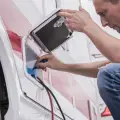Hey! This site is reader-supported and we earn commissions if you purchase products from retailers after clicking on a link from our site.
Full-time RVing has plenty of perks, including the freedom to travel where you want and whenever you like. However, keeping your generator topped off can mean taking regular stops and paying campground fees. Solar panels allow you to use the power of the sun to keep your RV energized in a renewable way that doesn’t require you to hook up to shore power.
Getting the best results from this route requires that you both consider which van solar panel setups are the most efficient while matching your RV’s particular needs. We’ve created a guide to help you decide which RV or van solar panels are best for your life on the road! Alright, let’s dive into these solar systems.
Our Top Solar Picks for Going Off-Grid
| Best RV Solar Panels | Category |
| Renogy 12 Volt Solar Premium Kit | Best Rigid Solar Panels |
| ALLPowers Flexible Solar Panel | Best Flexible Solar Panels |
| Renogy 100 Watt Portable Solar Suitcase | Best Portable Solar Suitcases |
| 400W Windy Nation Solar Panel Kit | Best High Power Solar Kit |
Reviews of the Best Options for Your Camper
Want to know more about our top picks? Check out all the details you need to know to make a confident decision about selecting the best solar panel for your needs.
Best Rigid Solar Panels
Renogy 12 Volt Solar Premium Kit
To start our RV solar panels reviews, we’ll be looking at Renogy’s 12 Volt Solar Kit. As you’d expect out of the best rigid-style model available, this kit has a high sun to solar energy efficiency, which is just one of its benefits. Additionally, these panels are compatible with various mounting systems, so it won’t be too difficult to find suitable parts to set the system up. This exact model was used by our converted van expert Lindsey in her van solar setup – her van (named Venus) is pictured here!
These solar panels are also durable enough to stand up to heavy rain, winds, and even snow. Aside from not busting, the scratch resistance also cuts down on the chance of the cells not being able to absorb sunlight properly. The warranties are also reassuring: five years on material and labor along twenty-five years for power output. This kit will last!
Because of their durable materials, though, the panels are more massive than some others, which can put a strain on your RV without proper planning. Read my full Renogy 200 Watt Solar Starter Kit review for more.
Pros:
- Excellent warranties
- Suitable for harsh winds and rain
- Works with multiple mounting systems
Cons:
- Heavier than other models
Best Flexible Solar Panels
ALLPowers Flexible Solar Panel
If you need your solar panels to contour to some weird shapes around your vehicle, flexible is the way to go – and ALLPowers Flexible Solar Panels are our top pick in this category. Because of their less rigid layout, you can apply this solar panel kit to irregular surfaces up to a maximum angle of thirty degrees. This capability also lets you have a low profile option atop your RV.
Not only do they apply well to various surfaces, but these solar panels also have a high conversion efficiency, meaning that they make the most out of the sun to give you power. ALLPowers also provides an eighteen-month operation guarantee, so you know the manufacturer has confidence in their product to last.
Even so, it’s not as durable as the rigid options; they can break if you bend them too far past their threshold. I have a full ALLPowers Solar Panels review with a bunch more info.
Pros:
- Low profile appearance on your RV or van
- Eighteen-month guarantee
- High conversion rate
- Excellent for use on irregular surfaces
Cons:
- Panels may break if you bend them too far
Best Portable Solar Panels
Renogy 100 Watt Portable Solar Suitcase
As a portable solar suitcase, this offering from Renogy gives you the convenience of being able to set up your panel in a way that always gets the best angle from the sun. That portability also means you can put it away whenever the weather turns sour. Even so, this kit is highly durable, so you won’t need to worry about it too much.
Additionally, this kit can provide high output energy, even though it is a single panel, giving it appealing efficiency. Like the other Renogy product on this list, their portable solar kit has the same twenty-five-year extended warranty attached.
While an excellent pick for those who have RV solar panel experience, it does have a high learning curve, making it unsuitable for those new to the process. Read all about my experience in my full Renogy 100 Watt Portable Solar Suitcase review.
Pros:
- Suitable to charge larger batteries
- Suitcase setup is highly portable
- Twenty-five-year power warranty
Cons:
- Has a very high learning curve for those new to RV solar panels
Best High Power Solar Kit
400W Windy Nation Solar Panel Kit
If you’ve done the calculations and know that you’ll need lots of power, then this kit is one of the most suitable out there. Not only does it have the capacity to provide for RVs that go through lots of energy in one day, but the complete kit has everything you need to install and run it—including a solar battery bank if your vehicle doesn’t have one already.
The solar charge controller gives you plenty of readouts if you want to know what your panels are doing at any time. The screen also gives you the options to adjust your settings if necessary. If you’re new to the world of RV solar panels, this set provides an excellent start.
On the downside, you won’t be able to upgrade the charge controller in the future, so keep that in mind. Read more about that and other notes on my experience with it in my entire Windy Nation Solar Panel Kit review.
Pros:
- The kit comes with multiple high power panels
- Monitor with easy access to readouts and setting adjustments
- Comes with all installation parts
Cons:
- Not possible to upgrade the charge controller
Recap: Best RV Solar Panels
- Renogy 12 Volt Solar Premium Kit – Best Rigid Solar Panels
- ALLPowers Flexible Solar Panel – Best Flexible Solar Panels
- Renogy 100 Watt Portable Solar Suitcase – Best Portable Solar Panels
- 400W Windy Nation Solar Panel Kit – Best High Power Solar Kit
Things to Look Out For When Buying Solar Panels for RVs and Converted Vans
These four choices are easily our top picks, but it is essential to take the time to find the best RV solar kit that meets your setup’s specific needs. Whether you can’t decide between what we’ve recommended, or you want to scour the market further for the optimal product, keep these factors in mind while you shop.
Solar Panel Structure
When it comes to solar panels, there are three main categories of structure that you have to choose from:
- Rigid
- Flexible
- Portable
A rigid set of solar panels has the cells mounted under tempered glass, while also containing everything in an aluminum frame. Because of the high levels of protection, these panels can handle all types of weather, from wind to sand to hail and more.
This construction means that they are one of the more durable types, and the glass is resistant to scratching – meaning that you can use an ice scraper on them without worry when ice or snow gets in the way. The rigid structure also makes them simple to adjust to best face the sun, and this model comes in a range of sizes with an affordable cost per watt.
As you may suspect, flexible solar panels aren’t as rigid, and they have the advantage of being able to lie flush with the roof of your RV or van, which means you don’t have to worry about the blocky appearance of their casing. Modern flexible-style panels have become more capable of handling bends and curves, but this setup also means they have less consistent direct exposure to sunlight. While sturdy, the plastic coating is prone to scratches, which can impact performance.
Finally, portable RV solar panels come in standalone units, sometimes shaped like briefcases. The goal is to have an easy solution that’s adjustable to the perfect angle. You can set it out in the sun to collect energy while your RV stays cool in the shade. On the downside, you can’t charge while driving, they take time to set up, and you’ll be using valuable storage space.
Which type works best for you will depend on your camping conditions. Those who regularly go through harsh weather will want rigid panels that can stand up to severe weather, while someone interested in stealth camping will find flexible panels or even a portable kit more appealing. Portable solar kits also let you provide a quick charge to small devices, plus they’re generally more affordable than a full panel outfitting job.
Solar Panel Cell Type
Aside from determining the optimal solar panel setup, it also helps to understand the different types of cells available. This factor refers to the material that makes up the panel. Once again, there are three main types:
- Monocrystalline – The most efficient model, taking up less space per watt, but it also costs a bit more.
- Polycrystalline – In contrast, polycrystalline panels need more space per watt, yet are less expensive.
- Amorphous – This type of panel takes up more weight, space, and even cost per watt, but they provide much more efficient results when traveling in cloudy weather or under partial shade.
In the end, choosing between the mono and polycrystalline varieties of panels isn’t your biggest concern. These two ultimately are roughly the same amount of durable. Plus when you shop for an RV solar kit, you’ll mostly be focusing on how much wattage you need. A 100-watt panel will still provide you 100 watts, despite what type of crystals you use—understanding them will help you make a more informed decision.
While amorphous solar panels exist, they’re more suited to other areas, rather than outfitting your RV or converted van.
Determining Solar Power Needs
Your new solar panel purchase won’t do you much good if they can’t provide the amount of power you need. There are online calculators you can use to determine how much power you’ll need.
Additionally, by boondocking and keeping track of how long your RV will run without any generators can help you estimate the amount of solar power you’ll need. First, you want to know how many amp-hours of energy your battery can provide. Then reduce that number to 75% percent, as this is the max amount of energy you can use.
Once you know how many days your battery power can last, you divide the max amp hours of energy by days. This calculation will let you know your daily amp-hour usage. For example, if your battery can provide 200 amp hours, that means you can get a maximum of 150 in use. If your RV lasts for four days, then you need roughly 38 amp-hours per day to work.
On average, one 100-watt solar panel can provide roughly thirty amp hours of energy per day. Maintaining air conditioning takes approximately three or four solar panels.
If you have way bigger energy requirements, check out some generator options, which requires a converter or inverter/charger to charge your battery. Shore power is obviously another option if you plan to travel between campgrounds.
Ease of Installation
Since full-time RVing involves a lot of close budgeting, you’ll want to make sure you can install your solar panels on your own. Additionally, you can wire solar panels in different configurations (in series vs. in parallel), which can impact efficiency, as well as gear.
As a buyer, you want to aim for a kit you can handle as a DIY job, plus you need to consider the installation costs as part of your budget.
Efficiency
Finally, you want to pay close attention to how efficient your solar panels are. A more effective system will help your motorhome run better, and a better-performing solar power system will mean you can get more use out of the space you have to mount them. As we discussed in the types of panels section, the kinds of solar cells you have can play a role in their efficiency, but even this capability can vary between similar models.
That’s it! As long as you’re doing research on rigging up your RV power source, check out our full guides on converted van electrical setups and RV electrical setups.
Frequently Asked Questions
How Many Solar Panels Do I Need To Run My RV?
This depends, mostly on the size of your RV and the size of your batteries. If you only have a 12V battery, then 300 watts should be able to charge that up enough to use. If you have more than one 12V battery or 6V batteries then you should have at least 600 watts. There is also no problem with having larger solar panels, these are just the minimum recommended wattages for specific batteries.
Are RV Solar Panels Worth It?
We think they are worth it. While it might be difficult to run your RV all the time solely off of solar power, it can be a great way to supplement connecting to shore power or using a generator. While shore power might not always be available if you are off the grid, and running a generator does not always make sense, especially if you’d like a peaceful night, solar is a great way to help power your RV. Be careful if you live in an extremely hot or cold environment as both batteries and solar panels might not be capable of producing peak power in these conditions.
What Is The Life Expectancy Of Solar Panels?
While solar panels do not last forever, they last considerably longer than your batteries, or even your RV. Most solar panels last 25-30 years and even more. To prolong the life of your solar panels, cover them when they are not in use, and if they get overly dirty, wash them!




